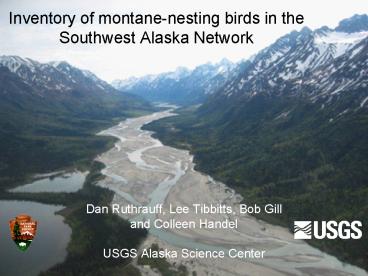Inventory of montanenesting birds in the Southwest Alaska Network
1 / 22
Title:
Inventory of montanenesting birds in the Southwest Alaska Network
Description:
Inventory of montane-nesting birds in the Southwest Alaska Network ... Olive-sided Flycatcher. 3. Rusty Blackbird. 2. Blackpoll Warbler. Number. Detected. Species ... –
Number of Views:24
Avg rating:3.0/5.0
Title: Inventory of montanenesting birds in the Southwest Alaska Network
1
Inventory of montane-nesting birds in the
Southwest Alaska Network
- Dan Ruthrauff, Lee Tibbitts, Bob Gill
- and Colleen Handel
- USGS Alaska Science Center
2
Background Previous Work
- Species lists, seasonal observations (e.g.,
Proenneke, Cahalane, Gibson, etc.) - Focused, species-specific (e.g., Surfbird,
coastal birds)
3
Objectives
- Document the occurrence of at least 90 of the
montane-nesting species that occur in each park - Describe distribution and relative abundance of
species within each park - Provide information from which to develop a
monitoring strategy
4
Challenge of study design
- Steep, snow-covered mountains, glaciers, and.
5
thick vegetation
6
Study Area
- Lake Clark NPP, Katmai NPP, and Aniakchak NMP
- Area 35,300 km2
7
Study Grid
- State-wide grid of 10 X 10 km study plots
- Anticipated sampling of 2030 plots during spring
sample period
8
Criteria for Plot Inclusion
- gt 50 of plot within park boundaries
- Montane areas (gt100 m a.s.l.)
- Unglaciated
- lt50 slope
- Plots allocated in proportion to ecological
subsection within sample
9
Resulting in our sample universe
Green within sample
Red outside sample
10
- Despite removal of steep, glaciated areas, large
sections within Chigmit and Neacola Mountains
still remain within sample
11
Point-count Methodology
- Two-person teams
- 1020 unlimited distance point-counts spaced 500
m apart per plot - Points allocated proportional to subsection type
within plot - 12 days at each plot
- Sampling done early spring
12
Results
- 1629 May revisit of 35 points 912 June
- 22 plots sampled (green) 7 plots not visited
(red) - 379 points conducted 95 hours of surveys total
13
Results
- 99 species detected overall (5 added with June
visit) - Average 21.7 1.75 SE species per plot range
846
46
42
42
42
43
12
14
Most Commonly Detected Species
15
High-Elevation Species
16
Species of Concern
Wandering Tattler
17
Distribution
Blackpoll Warbler
Golden-crowned Sparrow
18
- Comparison to Other Studies
19
Comparison to Other Studies
Mean number of individuals per point This Study
6.7 0.28 SE Arctic Network 5.6 0.13
SE Mean number of species per point This
Study 4.3 0.14 SE Arctic Network 3.5 0.06
SE Total number of species detected This
Study 104 Arctic Network 115
20
Relevance to Future Monitoring Efforts
- Baseline inventory of distribution, relative
abundance, and habitat and landscape feature
associations - Ability to monitor population trends with future
replication - Specific focus on birds typically
underrepresented in more traditional bird
surveys ability to plan targeted studies
hereafter
E.J. Peiker
Lesser Yellowlegs
21
Whats Next
- 2005 Field StudiesKatmai NPP, Aniakchak NMP
- Continue AnalysesSpecies-specific density
estimatesSpecies-habitat associations
22
Acknowledgements
- Staff of Lake Clark NPP (Leon Alsworth, Lee Fink,
Joel Hard, Judy Putera) - Prism Aviation (Paula Huckleberry) Bill Michaels
(All West Freight) - SWAN IM (Alan Bennett, Dorothy Mortenson)































